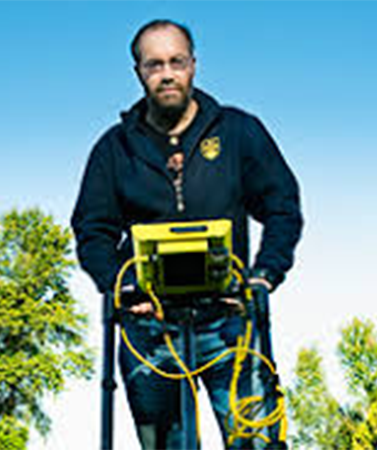About
2008 Bachelor of Arts (Anthropology) UBC
2015 Master of Arts (Anthropology) UBC
Master’s Thesis Title: GROUND PENETRATING RADAR APPLIED: A MODEL FOR QUANTIFYING INTERPRETATION OF HUMAN BURIALS IN HISTORICAL CONTEXTS
PhD Supervisor: Dr. Andrew Martindale
Research
Research Keywords:
NW Coast archaeology, Fraser Delta history, Musqueam community, Marpole
Research Summary:
Our understanding of the indigenous archaeological and cultural history of the Pacific Northwest Coast was based in part on work performed by Dr. Charles E. Borden of UBC beginning in the late 1940s. This archaeological sequence covers the last 5,000 years in the Fraser River Delta region, including the traditional territory of Musqueam First Nation. However, to date there has been little analysis of Borden’s data compiling and collating it against later work, and producing a final report of his findings.
My early research on Marpole-based archaeology focused on specific sites on or near Musqueam IR No. 2 at the mouth of the Fraser River in the SW Vancouver area. My related PhD research is archival in nature comparing Borden’s typologies against more recent belongings and settlement data and evaluates whether Borden’s original schema continues to have merit. Though I will query and test the LOA database and archival records to reassess Borden’s hypothesized cultural sequence, I will also account for the perspectives of the descendant Musqueam community in reassessing this developmental scheme.
Our analysis of Borden’s archive thus far has focused on his 1949-1950 field notebooks, his notes on cataloguing belongings, his maps and drawings, the belongings themselves from this work, and associated materials from the excavations. Our 1949 analysis has concluded and we have completed our inventory of all materials and data sets as well as a summary and analysis of his results. We think that this effort has provided valuable new data from c̓əsnaʔəm that few others have encountered and Borden himself did not fully disclose. Our current efforts seek to expand this knowledge to cover his other field seasons at c̓əsnaʔəm/Marpole up to 1958 and draw on a wider perspective.
The goal of my PhD program in alliance with Dr. Andrew Martindale is to complete the final project report that Borden never finished and to increase our mutual understanding of this important Musqueam settlement. Overall at UBC, my research within the Musqueam community has been ongoing since 2007 through various field schools, undergraduate and graduate level courses, teaching assistant assignments and participation in many social and cultural aspects.
Publications
Conference Presentations:
2019 • Museum of Anthropology, International Archaeology Day “GPR Projects in Contrast”
2016 • Kwantlen Polytechnic University and BC Archaeological Forum
2016 • Society for Applied Anthropology 76th Annual Meeting, Vancouver, BC. “Finding the Missing: Combining Indigenous Knowledge, Archival Research, and Archaeology at the Kuper Island Indian Residential School”
2015 • BC Archaeological Forum: “GPR How To Make It Work”
2010‐12 • Contributor Kaukana Sicily archaeological reports (GPR section) (R.Wilson)
2010 • Kwantlen Polytechnic University: “Kwantlen Ancestral (Re)Connections”
2010 • UBC Archaeology Day: “Application of GPR in Archaeological Contexts Old and New”
2008‐10 • Co‐contributor UBC‐Musqueam Field School Reports (With A.Martindale et al)
2008-10 • Musqueam Indian Band: “Musqueam 101” (multiple)
Awards
2019-2020 Research SSHRC Grant from Government of Canada2019 B.C. Graduate Scholarship ($15,000)
2019 UBC Faculty of Arts Graduate Award ($8,000)
2009 Research SSHRC Grant ($17,500) from Government of Canada
2008 UBC Graduate School Entrance Scholarship ($5,900)
2008 TLEF Research Grant (co‐applicant with Dr. Martindale et al) of $70,000
2008 UBC Faculty of Arts Award
2008 UBC Undergraduate Research Grant ($8,580)
2007 UBC Alumni Association, UBC Trek Excellence, Margaret Lawrence Scholarship in Arts
2006‐2008 Dean of Arts List
2006 UBC Scholarships (Dorothy and Arthur Holt, Kinu Uchida and Ward‐Essof
2005‐06 Kwantlen President’s Honour Roll
2005‐06 Kwantlen Dynamex Scholarship
Additional Description
Ground Penetrating Radar
My thesis explores the applied use of Ground Penetrating Radar (GPR) technology in conducting comprehensive burial survey work in historic period, post-contact cemeteries. These results are based on research conducted from 2008 to 2011 within several First Nations post-contact cemeteries along with work done in other less-defined burial sites in Southwestern British Columbia. My research has been informed by other types of GPR surveys conducted during that period and through 2015, that have added experience in GPR project management, data collection, trace signal analysis, interpretation and reporting. I have developed a recursive, interpretive model that creates a simple, direct and more objective process for evaluating any single or group of potential burial locations situated in a variety of physical contexts. The basic analysis is done by linking GPR signal results obtained from over 300 cases with either prior historical or field-work based knowledge of related ground surface, physical, ethnographic and documentary evidence. The model developed here quantifies the interpretative analysis of these data and develops what I refer to as a Burial Confidence Index (BCI) from a set of parameters or variables that reflects the full extent of our knowledge of any specific location. This allows for testing and statistical comparison of known versus previously unknown locations where GPR evidence is recovered. Other important aspects of GPR-related work in the community are also addressed in brief to provide more complete coverage of the many contexts involved, including professional, academic and social considerations.
Anthropological Archaeology
2016‐2020 Co‐instructor / Advisor for UBC ARCL 406 lab course (three years)
(Conducted classroom sessions and student assistance)
2019‐2020 Dept. of Anthropology Senior T.A.; Teaching Assistant ARCL 203, ARCL 103
2008‐2012
Teaching Assistant ARCL 103, ARCL 203, ANTH 300, ANTH 400, ANTH 306 (Field School)
Research assistant in ANTH 306 (Field School)Anthropological Archaeology
